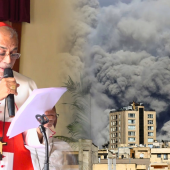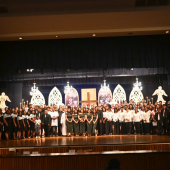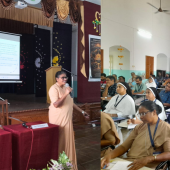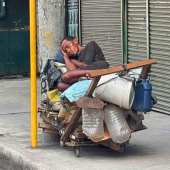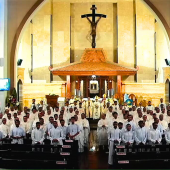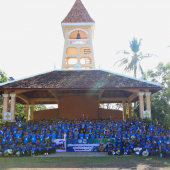Former Kurnool bishop in India dies aged 92
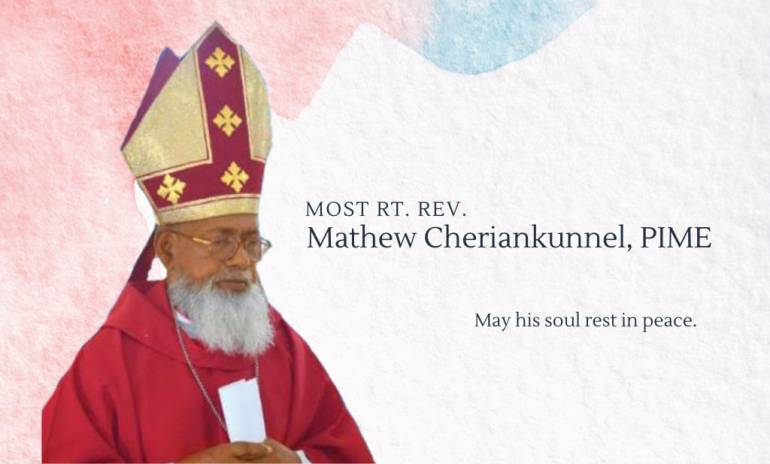
Mathew Cheriankunnel, Bishop Emeritus of Kurnool, Andhra Pradesh, India passed away on March 30 died. He was 92.
He died of old-age-related illnesses at Pontifical Institute for Foreign Missions (PIME) House Eluru, Andhra Pradesh.
Funeral Mass will be celebrated on April 1 at Amalodbhavi Matha Cathedral, Eluru at 10.30 am by Bishop Jaya Rao Polimera of Eluru.
His mortal remains will be taken to Gunadala in the Vijayawada diocese and will be buried in the Lourdes Matha shrine cemetery at Gunadala. The funeral rites will be officiated by Archbishop Prakash Mallavarapu of Vizhakapattanam, said Father Stephen Alathara, deputy secretary general, of the Conference Catholic Bishops in India.
Cheriankunnel, a member of PIME, was born on August 15, 1930, to Mr. George and Elizabeth at Kadayanikad, village, St Mary’s Church of the archdiocese of Changanacherry, Kerala, India.
He was baptized in his parish on August 23, 1930. After his schooling in his home village, he joined the diocese of Vijayawada.
He did his seminary studies at Sacred Heart Seminary, Poonamallee, Chennai, Tamilnadu, and was ordained a priest on April 28, 1962.
After his schooling in Kerala, he joined the diocese of Vijayawada which was newly formed by the great missionary work of PIME missionaries.
He did his Theology at Sacred Heart Seminary, Poonamalle (Chennai) Tamilnadu, and was ordained a priest on April 28, 1962.
After his priestly ordination, he was appointed as assistant parish priest at Machalipatanam under Father Venturin, PIME.
Then he was appointed as assistant parish priest of Kamavarapukota under Father Vivenzi, PIME from 1964 to 1965. In 1965, he became parish priest of Kamavarapukota.
He entered PIME on May 3, 1969, and made a final vow on December 31, 1970.
While staying in the PIME Generalate, Rome, he took Licentiate in Missiology. At the end of 1971, he came back to the diocese of Vijayawada and was appointed as parish priest of Mylavaram. He was made the first bishop of Nalgonda in 1977.
His Episcopal consecration took place on May 30, 1977, at Gunadala (Vijaywada).
He did enormous missionary work in the diocese. During his time many parishes were established and numerous nuns arrived in the diocese of Nalgonda.
He was transferred from the Nalgonda diocese to the Kurnool diocese in 1987.
Later he was appointed as co-adjutor of the Kurnool diocese and became Bishop of it in 1988. He resigned as Bishop of Kurnool in 1991.
Then he helped Father Augustine Palett, PIME at Lady of Velankanni parish, Irla, Mumbai, for one year.
In 1992, when the Queen of Apostles Seminary was opened in Eluru, he worked there as a spiritual director from 2002 to 2003. He was also a pro-rector in the same seminary.
Then, when Father Augustine Mundópalakal opted for the mission of Badrachalam, he joined him in the mission. When the Badrachalam parish was given to the diocese of Khammam, Bishop Mathew came to PIME Regional House, Eluru in 2006.
From that time on, he has been staying in the PIME Regional House, yet giving his service wherever it was needed.
He used to go to the Gavaravaram substation church of Eluru Cathedral Church for every Sunday Mass.
He is a priest for 59 years and a Bishop for 44 years.
He is known for his simplicity of life, as an exemplary priest and bishop. He strictly followed a life of poverty. He never aspired for luxury things and life.
He is a truly dedicated servant of Jesus. In his writing and sermons, he always exalted the priests and nuns to live a life acceptable to the Lord.
He is a great devotee of Blessed Paolo Manna, a PIME priest, who was a missionary in Myanmar.
He wrote an autobiography and one book and some articles.
(With inputs from Pujitha Yadala)
Radio Veritas Asia (RVA), a media platform of the Catholic Church, aims to share Christ. RVA started in 1969 as a continental Catholic radio station to serve Asian countries in their respective local language, thus earning the tag “the Voice of Asian Christianity.” Responding to the emerging context, RVA embraced media platforms to connect with the global Asian audience via its 21 language websites and various social media platforms.









